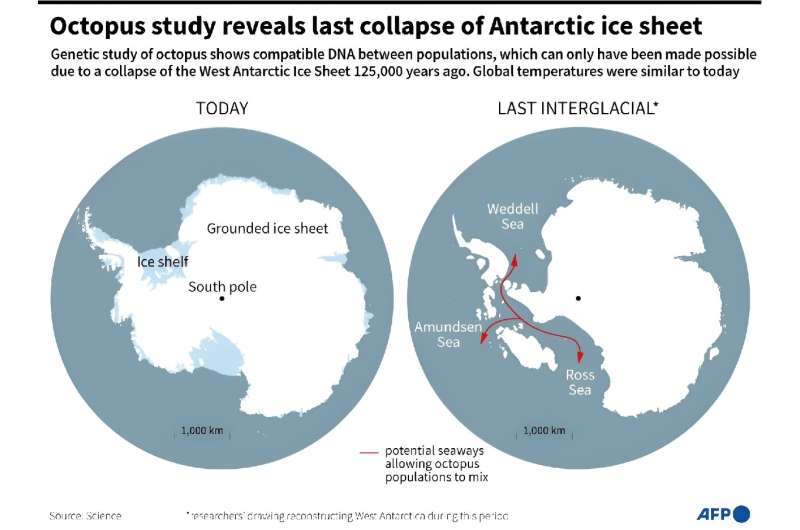Newly Discovered Antarctic Octopus DNA Suggests Imminent Ice Sheet Collapse

December 21, 2023
The contents of this article have been diligently verified in accordance with the Science X's editorial procedures and rules. The editorial team has ensured the credibility of the content by assessing the following elements:
- fact-checking
- review by peers
- source from a respected news outlet
- proofreading
by Issam AHMED
Researchers probing Antarctica's ice sheet history have adopted a novel method: they are studying the genes of octopuses that dwell in these cold aquatic environments.
A new study released on Thursday in Science reveals that distinct groups of these eight-armed marine creatures interbred about 125,000 years ago, indicating an ice-free passage during a period corresponding to today's global temperatures.
The study's revelations imply that the West Antarctic Ice Sheet (WAIS) is on the verge of collapsing sooner than previously assumed, risking 3.3-5 meters of long-term sea level increase if we fail to limit the rise in anthropogenic global warming to the Paris Agreement's target of 1.5 degrees Celsius, the authors emphasised.
The paper's main author, Sally Lau of James Cook University in Australia, conveyed to AFP that being an evolutionary biologist studying marine invertebrates, she uses DNA and biology to comprehend and gauge alterations to Antarctica in ancient times.
She stated that Turquet's octopus is an excellent choice for studying the WAIS primarily because this species is found all around the continent, and essential details about it, such as its lifespan of 12 years, and it having evolved approximately four million years ago, have already been established by Science.
These creatures, about half-a-foot long excluding the tentacles, and weighing around 1.3 pounds, lay limited but large eggs on the sea floor. This implicates their need to invest substantial effort in ensuring their offspring's survival—a lifestyle that restricts them from venturing too far.
Their habitat is also constrained by round sea currents, also known as gyres.
By sequencing the DNA across genomes of 96 samples, mostly collected unintentionally as fishing bycatch, Lau and her team discovered evidence of one-time paths across the West Antarctic that linked the Weddell, Amundsen and Ross seas.
The genetic mixing history suggested two incidences of WAIS collapsing—first during mid-Pliocene, 3-3.5 million years ago, an occurrence scientists were already sure of, and the last one during the Last Interglacial, a warm period from 129,000 to 116,000 years ago.
'This was the last time the planet was approximately 1.5 degrees warmer than pre-industrial times,' Lau notes. Human activities, chiefly fossil fuel combustion, have so far increased global temperatures by 1.2C relative to the late 18th century.
Some earlier studies implied a past collapse of WAIS, but they weren't entirely convincing due to the comparatively lower resolution genetic and geological data.
'This study provides empirical evidence indicating that the WAIS collapsed when the global mean temperature mirrored today's, suggesting a looming tipping point for future WAIS collapse,' the authors wrote.
A sea level rise of 3.3 meters could drastically alter the world map, with low-lying coastal regions expected to be entirely submerged.
In a concurrent commentary, Andrea Dutton of the University of Wisconsin-Madison and Robert DeConto of the University of Massachusetts, Amherst lauded the new research as 'groundbreaking,' but expressed that it poses thought-provoking questions about the likelihood of history repeating itself.
However, they cautioned that multiple crucial questions remain unanswered, such as whether the ice sheet collapse in the past was triggered solely by escalating temperatures, or if other factors like shifting ocean currents and intricate interactions between ice and solid Earth also had roles to play.
It's also uncertain if the sea level rise would span millennia or transpire suddenly.
Nevertheless, uncertainties like these should not justify inaction against climate change, 'and this latest piece of evidence from octopus DNA stacks one more card on an already unstable house of cards,' they argued.
Journal Information: Science
© 2023 AFP




